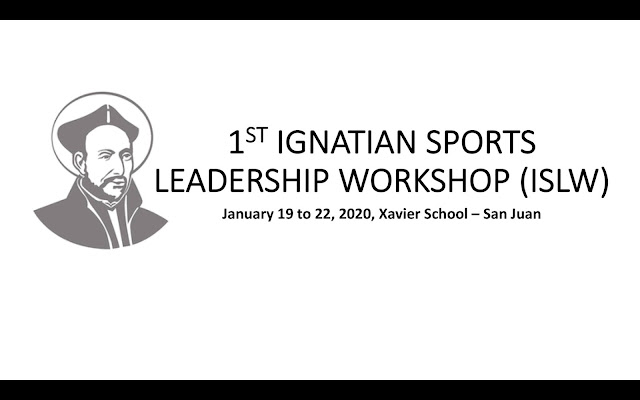Wanted: Transformational Sports Leaders
The sports world has become such a powerful venue to shape
lives of people, entertain people and even unite people. More importantly, sports
is in a great position to form people, especially the youth. This has now
become the bigger picture and noble approach towards sports over the “win at
all cost” mindset. While this is already well-known among sports leaders, it is
also often forgotten, ignored and pushed aside.
At a recent workshop called “Ignatian Sports Leadership
Workshop” held at the Xavier School in San Juan, a group of sports directors,
coaches and teachers of Jesuit schools from across the country got together to
review once more why these schools give sports the attention it has been
getting. The Jesuit schools represented were the host Xavier School San Juan,
Xavier School-Nuvali, Ateneo de Manila, Ateneo de Naga, Ateneo de Iloilo,
Sacred Heart School-Ateneo de Cebu, Loyola College of Culion, Xavier
University-Ateneo de Cagayan, Ateneo de Davao and Ateneo de Zamboanga. It was
ironically the first-ever formal workshop for the group even if they had
exchanged notes and have had meetings in the past. But the workshop set
everything aside for all to take a second look on whey they were into sports
and what kind of sports leaders were needed to run such sports programs.
Allow me to discuss a few points from one speaker of the
workshop for now as I surely won’t be able to put all talks in one column.
Ateneo de Zamboanga President Fr. Karel San Juan, SJ kicked things off with a talk
about Ignatian Leadership. It was a summary of what is expected of leaders
working in Jesuit schools as they embrace Ignatian spirituality and work for
the vision and mission of the school. Before anything else, we have to accept
and face the hard realities of being leaders. We recognize that we are
deficient; we have fears, and we may misuse the power given to us. And because
of all this, we at times, fail as leaders. Thus, there is the call to be
inspiring leaders. “Leaders need to inspire people not just so they can follow,
but so they can be leaders as well. More leaders and followers build the
communities we desire,” Fr. Karel stressed. We can be inspiring by being humble,
having courage and being magnanimous. All three have to integrate. “Humble
leaders, courageous leaders, magnanimous leaders can inspire,” Fr. Karel added.
Fr. Karel then quoted Pope Francis, citing one of his Ted
Talks videos where the Holy Father spoke on “Power and Tenderness.” Pope
Francis said, “And what is tenderness? It is the love that comes close and
becomes real. It is a movement that starts from our heart and reaches the eyes,
the ears and the hands. Tenderness means to use our eyes to see the other, our
ears to hear the other, to listen to the children, the poor, those who are
afraid of the future.” And for leaders who wield a lot of power, “Please, allow
me to say it loud and clear: the more powerful you are, the more your actions
will have an impact on people, the more responsible you are to act humbly. If
you don’t, your power will ruin you, and you will ruin the other.”
Having heard all that, it would seem that to be a leader is
a task straight from the movie “Mission Impossible.” Can I truly change lives?
Can I really transform the coaches and athletes under our care? Can I inspire
them to become better versions of themselves?
“Where lies our hope as leaders?” Fr. Karel asked. “Our hope
is in Jesus, our leader, teacher, formator,” he replied. This is why
spirituality is necessary for one to become an inspiring and transformational
leader. “We need His spirit and our dependence on Him will keep is in line.”
There is a need to be formed to become servant leaders and we must allow
ourselves to be formed.
With this as a starting point of the workshop, I already
felt loaded with heavy reflection, humbled at our littleness as a leader, and asking
if we were up to the task. Under our care as sports leaders are coaches and
student-athletes who have chosen the path of sports to grow as human beings. And
by choice, we are there as their leaders. Whoa! This had set the tone for the
rest of the three-day workshop that included talks from Noli Ayo of Ateneo de
Davao and Rey Reyes of Ateneo de Zamboanga who gave a talk on “On Culture
Building,” citing how the Mindanao Peace Games has become one of the most
revolutionary sports events in the country. Renowned public school teacher and
TOWNS awardee Sabrina Ongkiko presented to us a different outlook towards
coaching when she presented “The Coach as a Teacher.” Atty. Victor Africa, a sports advocate who
is also the President of the Philippine Fencing Association and a consultant of
the Philippine Sports Commission, presented a thought-provoking piece,
“Pamumunong Nagbabagong Hugis,” discussing what it takes to become a transformational
sports leader. We then had a special guest speaker in Brianna Leverenz, a
Division 1 NCAA swimmer from the University of Tennessee who is in the country
on a mission to inspire athletes. It sure looks like I’ll need ten more columns
to write about their talks.
Over-all, it was a refreshing review at why and how sports
leaders must take their roles not only seriously, but with a mission-like
madness. Coach Noli Ayo of Ateneo de Davao and lead convenor of the Mindanao
Peace Games summed it all up when he said that all of us are here on a mission,
and we can do two things: “We can do either something, or nothing.” Wanted:
Transformational Sports Leaders.











Comments